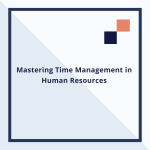In the world of Human Resources (HR), effective time management is crucial to ensuring smooth operations and maintaining organizational health. HR professionals often juggle a wide array of responsibilities, from recruitment and onboarding to compliance and employee engagement. With such diverse tasks, mastering time management is essential for HR teams to maximize productivity, enhance employee satisfaction, and contribute to the overall success of the organization. This article explores key strategies HR professionals can use to optimize time management and prioritize tasks effectively.
Table of contents [Show]
1. Prioritizing Tasks by Urgency and Impact
HR professionals face a range of tasks that vary in urgency and importance. Utilizing tools like the Eisenhower Matrix can help categorize tasks by urgency and impact. For example, compliance deadlines or critical employee issues should be prioritized, while less urgent tasks, such as scheduling events, can be planned for future attention. By focusing on high-impact activities, HR can address immediate needs while setting a foundation for long-term improvements.
2. Implementing HR Technology
Modern HR software can significantly streamline HR processes, reducing time spent on administrative tasks. Applicant tracking systems (ATS) speed up recruitment, while payroll software and self-service employee portals enable automated processes for payroll and attendance tracking. These tools allow HR teams to focus on more strategic tasks, such as employee development and engagement, by automating routine work and improving accuracy.
3. Time Blocking and Batch Processing
Time blocking is a powerful time management technique for HR professionals handling varied tasks. For example, dedicating specific hours each day for emails, recruitment, or policy reviews ensures focused, uninterrupted work. Similarly, batch processing can be effective for repetitive tasks like onboarding documents or benefit enrollment. By grouping similar tasks together, HR professionals can improve efficiency, stay organized, and reduce the mental shift between different types of tasks.
4. Setting Clear Communication Protocols
HR departments deal with constant communications, from answering employee questions to collaborating with management. Setting clear protocols, such as designated times for answering emails or weekly updates, can help manage communication flow without interruptions. Additionally, establishing clear expectations with employees on communication guidelines fosters a smoother process and reduces time spent on repetitive inquiries.
5. Delegating When Possible
Effective time management in HR involves knowing when and what to delegate. While HR professionals often feel responsible for various tasks, delegating administrative tasks to team members or assistants can free up time for strategic initiatives. Delegation also empowers junior team members, providing them with valuable experience and contributing to their professional growth.
6. Setting Boundaries and Managing Interruptions
HR departments are often seen as the go-to resource for all employee issues, which can lead to frequent interruptions. Setting boundaries, such as designated office hours for consultations, can help manage these disruptions. Additionally, utilizing “do not disturb” signals or creating policies for non-urgent queries can minimize interruptions and allow HR professionals to focus on priority tasks.
7. Regularly Reviewing and Adjusting Workflows
The HR landscape is constantly evolving, and so are its demands. Regularly reviewing workflows allows HR departments to identify inefficiencies and adjust as needed. Whether it’s refining the onboarding process or updating recruitment procedures, continuous improvement is essential. Periodic reviews not only optimize workflows but also ensure that the HR team is aligned with organizational goals.
Conclusion
Time management is a critical skill for HR professionals who need to balance a variety of tasks while contributing to the organization’s overall success. By prioritizing tasks, utilizing technology, and establishing clear communication and workflows, HR teams can improve efficiency and focus on what truly matters: supporting employees and fostering a positive workplace environment. As HR continues to play a central role in organizational growth, mastering time management becomes an indispensable asset that empowers HR professionals to make meaningful, lasting contributions.





